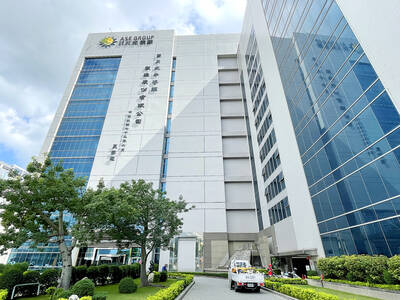The Financial Supervisory Commission (FSC) yesterday approved the nation’s first micro-insurance policy to provide accidental injury protection to financially disadvantaged people.
Cathay Life Insurance Co’s (國泰人壽) new policy has no age limitations for policyholders as long as they meet the qualifications, Joanne Tzeng (曾玉瓊), deputy director-general of the Insurance Bureau, told a media briefing.
Micro-insurance policyholders will have to pay a premium of NT$6.58 per policy for benefit coverage of NT$10,000 or NT$197 for a policy with a maximum benefit of NT$300,000, she said.
Tzeng said an estimated 1 million people could benefit from the new policy.
Micro-insurance refers to insurance policies characterized by low premiums or low coverage limits and designed to service low-income people and businesses not served by typical social or commercial insurance schemes.
In keeping with the commission’s regulations, single individuals who earn less than NT$250,000 a year or double-income families with annual earnings of less than NT$500,000 will be eligible to purchase life and accident insurance policies under the new program.
Aborigines, local or foreign fishermen with local IDs, or people helped by social welfare groups will also be included in the scheme, the commission said.
The commission is reviewing applications submitted by two other firms, Nan Shan Life Insurance Co (南山人壽) and Fubon Life Assurance Co (富邦人壽), and two non-life insurers who want to launch similar micro-insurance policies with death and casualty benefits, Tzeng said.

EXPANSION: The investment came as ASE in July told investors it would accelerate capacity growth to mitigate supply issues, and would boost spending by 16 percent ASE Technology Holding Co (ASE, 日月光投控), the world’s biggest chip assembly and testing service provider, yesterday said it is investing NT$17.6 billion (US$578.6 million) to build a new advanced chip packaging facility in Kaohsiung to cope with fast-growing demand from artificial intelligence (AI), high-performance-computing (HPC) and automotive applications. The new fab, called K18B, is to commence operation in the first quarter of 2028, offering chip-on-wafer-on-substrate (CoWoS) chip packaging and final testing services, ASE said in a statement. The fab is to create 2,000 new jobs upon its completion, ASE said. A wide spectrum of system-level chip packaging technologies would be available at

Taiwan’s foreign exchange reserves hit a record high at the end of last month, surpassing the US$600 billion mark for the first time, the central bank said yesterday. Last month, the country’s foreign exchange reserves rose US$5.51 billion from a month earlier to reach US$602.94 billion due to an increase in returns from the central bank’s portfolio management, the movement of other foreign currencies in the portfolio against the US dollar and the bank’s efforts to smooth the volatility of the New Taiwan dollar. Department of Foreign Exchange Director-General Eugene Tsai (蔡炯民)said a rate cut cycle launched by the US Federal Reserve

HEAVYWEIGHT: The TAIEX ended up 382.67 points, with about 280 of those points contributed by TSMC shares alone, which rose 2.56 percent to close at NT$1,400 Shares in Taiwan broke records at the end of yesterday’s session after contract chipmaker Taiwan Semiconductor Manufacturing Co (TSMC, 台積電) hit a fresh closing-high amid enthusiasm toward artificial intelligence (AI) development, dealers said. The TAIEX ended up 382.67 points, or 1.45 percent, at the day’s high of 26,761.06. Turnover totaled NT$463.09 billion (US$15.22 billion). “The local main board has repeatedly hit new closing highs in the past few sessions as investors continued to embrace high hopes about AI applications, taking cues from a strong showing in shares of US-based AI chip designer Nvidia Corp,” Hua Nan Securities Co (華南永昌證券) analyst Kevin Su

Nvidia Corp’s major server production partner Hon Hai Precision Industry Co (鴻海精密) reported 10.99 percent year-on-year growth in quarterly sales, signaling healthy demand for artificial intelligence (AI) infrastructure. Revenue totaled NT$2.06 trillion (US$67.72 billion) in the last quarter, in line with analysts’ projections, a company statement said. On a quarterly basis, revenue was up 14.47 percent. Hon Hai’s businesses cover four primary product segments: cloud and networking, smart consumer electronics, computing, and components and other products. Last quarter, “cloud and networking products delivered strong growth, components and other products demonstrated significant growth, while smart consumer electronics and computing products slightly declined,” compared with the